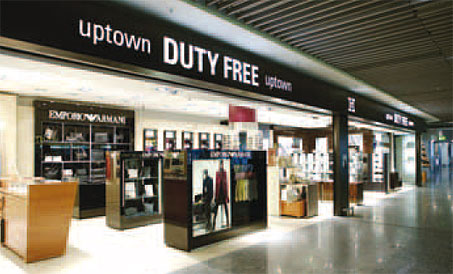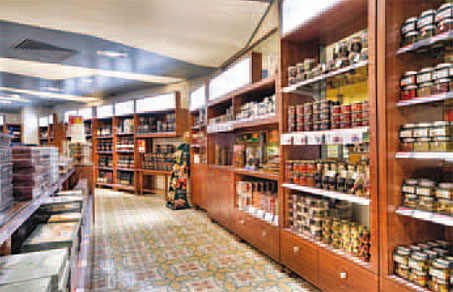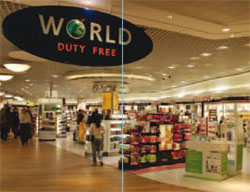
Restrictions on LAGs will be lifted in two stages; the first stage, which applies to passengers transferring within EU and EEA airports, will take effect from 29 April 2011, while two years later all restrictions on LAGs will be lifted in EU and EEA countries.
The travel retail sector has been confronted with a number of obstacles in recent months and with new regulations adding to passenger uncertainty, compared to the same period in 2008, European duty free sales dropped by 9.3% in the first eight months of 2009. Despite a slight recovery towards the end of the year, the industry is still battling against a variety of external factors.
Subway offers travellers a healthy alternative
Branded quick-service concepts offer travellers, employees and flight crews, snack and meal options from sources they know and trust. These days, airline passengers are especially drawn to brands that are known for value, convenience, service and supporting healthy lifestyles and the Subway brand excels in all of these areas. With made-to-order sandwiches on freshly baked bread, the Subway chain has earned a reputation for offering a healthier alternative to traditional fast food.
With a proven track record that dates back to 1965, the Subway sandwich chain is one of the world’s most recognised brands with more than 32,000 locations in 90 countries, including approximately 90 regional and international airports around the globe.
A Subway restaurant is an especially good match for an airport facility. It can be run by airport staff, a foodservice contractor or space can be leased to a local franchise, which would handle all of the operational details. Boasting some of the lowest start-up costs in the industry, a Subway restaurant can fit just about anywhere due to the chain’s minimal space and equipment requirements.
The Subway chain has also developed a self-contained kiosk concept that allows the entire restaurant to be quickly disassembled and moved to another location for the utmost in flexibility.
A combination of the single bag carry-on rule and restrictions on Liquids, Aerosols and Gels (LAGs) has played a major role in the downturn in sales within travel retail. However, in November last year, in a boost to the travel retail sector, a two-stage lifting of restrictions on air passengers carrying in excess of 100ml of LAGs was announced. The first stage, which applies to passengers transferring within EU and EEA airports, will take effect from 29 April 2011, while two years later all restrictions will be lifted in EU and EEA countries.
“We’re very happy with any lifting of restrictions that will make it easier for people to make purchases and bring them on to their final destination,” said O’Connell. “The biggest issue was the impact it was having on peoples’ propensity to shop due to the uncertainty it was creating. You find that if a passenger has one item confiscated, they’re unlikely to shop there again.”
In February, it was also announced that passengers buying duty free LAGs in the US and Canada will be able to keep their purchases when transferring onto flights at EU airports.
“This is very important indeed,” said Jankovec. “Any measure that ensures better harmonisation – especially on the transatlantic market, given its importance in volume – can only help the travel retail sector, particularly after what has been a very difficult period in the last year.”

The World Health Organization (WHO) has removed a provision from its draft strategy to reduce the harmful use of alcohol that had proposed taxing duty free alcohol sales.
WHO removes alcohol proposal
In January, the travel retail sector was given another lift with the news that the World Health Organization (WHO) Executive Board had decided to remove a provision from its Draft Strategy to Reduce the Harmful Use of Alcohol that had proposed taxing duty free alcohol sales.
O’Connell said: “This ruling was so important as alcohol and liquor sales are extremely important because, in terms of sales, we’re talking about a vast range of products. People had to put a large amount of work into achieving this ruling in a very short space of time. The proposal suddenly appeared out of the blue in a draft strategy document so we didn’t have much time at all. The issue generated support and activity from pretty much all sectors of the industry.”
Tobacco sales under threat

O’Connell: “We’re very happy with any lifting of restrictions that will make it easier for people to make purchases and bring them on to their final destination.”
Despite these positive rulings on both LAGs and duty free alcohol sales, the industry still has a fight on it hands in its bid to overturn the WHO’s proposal to restrict duty free tobacco sales. The Framework Convention for Tobacco Control (FCTC) came into force in February 2005 and while none of the 165 countries that have ratified it have yet decided to ban duty free tobacco sales, it does offer scope for the removal of tobacco products from the duty free market.
“This proposal won’t alter the consumption of tobacco but it will have a huge and damaging impact on duty free sales,” explained O’Connell. “Tobacco is a very important revenue earner and it is linked to the sales of other products in the sense that it brings people into shops, it generates a lot of footfall and it leads onto other sales.”

O’Connell: “We don’t think the industry should be exempt from the regulations, but just that it should be recognised as a separate market.”
O’Connell also dismissed the notion that the proposed ban could help in the battle against the illegitimate trade in tobacco. He said: “We have to get the message across that a ban on duty free tobacco sales is nothing to do with the efforts to stop the smuggling of tobacco, which, of course, we are very supportive of.”
The single bag carry-on rule has also been a major cause for concern for the travel retail sector in recent months and Jankovec believes that airlines need to understand the impact it is having on duty free sales. He said: “In the present environment, where the aviation market is going through structural changes that will further reinforce the pressure of airlines on airport charges, retail activities play an increasing role in financing airport facilities and in the ability of airports to protect or reinforce their competitive position.”
Chauntry’s parking revenue solution
The biggest challenge facing airport parking is the steady increase in off-airport parking operators, offering low-cost parking at rates significantly discounted to those available at the airport.
This competition is a major concern for many airport operators and finding ways to keep customers and grow revenues is a priority. An increasingly popular approach is to offer pre-booking and sell car park spaces online.
Chauntry has been delivering its Parkspace solution to airports and the travel industry for over 16 years. Managing director Theresa Hughes said: “Chauntry clients recognise the need to develop more sophisticated parking products and introduce elements of yield pricing into their strategy in order to compete in today’s market. Our solutions are flexible enough to make this possible at an entry level for airports like Wellington in New Zealand just starting out with pre-booking, to highly sophisticated solutions for clients like BAA and Schiphol Airport with years of experience in pre-booking.”
There are several key elements to introducing a successful pre-booking programme at an airport; these include choice of product, a range of tariffs, a fast and simple consumer booking process and a focus on sales channels.
Jankovec continued: “Airlines which demand even lower airport charges while introducing rules that actively harm an airport’s ability to generate alternative revenues are potentially biting the hand that feeds them.”
In order to offer protection to the European travel retail industry, efforts are also ongoing to push for regulations that will differentiate the travel retail market from domestic, High Street retailing.
Having secured a legally binding text from the French National Assembly that recognises the French travel retail market as a separate channel to the country’s domestic markets in 2005, the ETRC is pressing for a more widespread European ruling.
O’Connell said: “At the moment, regulations vary from State to State, which makes it difficult for suppliers within travel retail. With this project, we are working on a timescale of three to four years to establish a recognised channel for travel retail to offer it greater protection. We don’t think the industry should be exempt from the regulations, but just that it should be recognised as a separate market.”
Pioneering marketing initiatives from SSP Finland
 A new marketing initiative at Helsinki Airport is giving passengers new reasons to visit the airport’s bars, restaurants and cafés. Passengers can now spend and earn frequent-flyer rewards when they buy food and drink at the airport’s terminals. SSP has teamed with airline Finnair to offer passengers the chance to redeem points, as well as collect them on all purchases over €10.
A new marketing initiative at Helsinki Airport is giving passengers new reasons to visit the airport’s bars, restaurants and cafés. Passengers can now spend and earn frequent-flyer rewards when they buy food and drink at the airport’s terminals. SSP has teamed with airline Finnair to offer passengers the chance to redeem points, as well as collect them on all purchases over €10.
Since the scheme was introduced in January, like-for-like sales have increased by an average of 25% and average spend has also improved.
SSP – in partnership with Finnavia – has also recently opened the luxurious Via Spa, which provides a range of treatments in plush and tranquil surroundings with views over the airport. Its services include short treatments especially designed for time-pressed transit passengers, and it features several saunas, a cold-water river-bottom pool and a mineral-water pool to alleviate travel fatigue and the effects of jetlag. SSP has also now opened a new restaurant called Seasons at Helsinki-Vantaa.
Helsinki-Vantaa is keen to develop its reputation as a major European portal, particularly among transfer passengers travelling between Europe and Asia.
Kalle Ruuskanen, managing director, SSP Finland, said: “The international travel business has been through a difficult period. However, although passenger numbers have not yet returned to pre-recession levels, our sales are better than ever.”
bagport’s lost property services
 The baggage service company bagport is continuing to develop its lost property services. Using its unique web-based system, missingX.com, bagport offers a user friendly software programme that aids the passenger in getting back their property as soon as possible, and that covers all the details related to found items: receiving, registering, storage, delivery and (if appropriate) auction.
The baggage service company bagport is continuing to develop its lost property services. Using its unique web-based system, missingX.com, bagport offers a user friendly software programme that aids the passenger in getting back their property as soon as possible, and that covers all the details related to found items: receiving, registering, storage, delivery and (if appropriate) auction.
All details are electronically captured, which enables printed receipts and bar coded labels for tagging each item, as well as statistical analyses and a ‘snapshot’ overview of stored items for management overview.
bagport offers a range of service products, systems and solutions for airport passengers that enhance customer satisfaction with excellent services to create a ‘feel good factor’ in air travel. Thorsten Meyer, sales manager for bagport Group, said: “The bagport concept combines professional expertise and international experience. We offer a range of products effectively and economically in the form of one-stop shopping.”
For bagport customers, the result is a comprehensive product and service package, providing custom-made solutions for facilities in worldwide locations for all areas of terminal baggage service management.
With the bagport system, airports either reduce costs or even turn costs into profits. bagport offers a complete passenger service range without capital expenditure for its partners as the bagport idea entails offering all solutions under a concession model.







